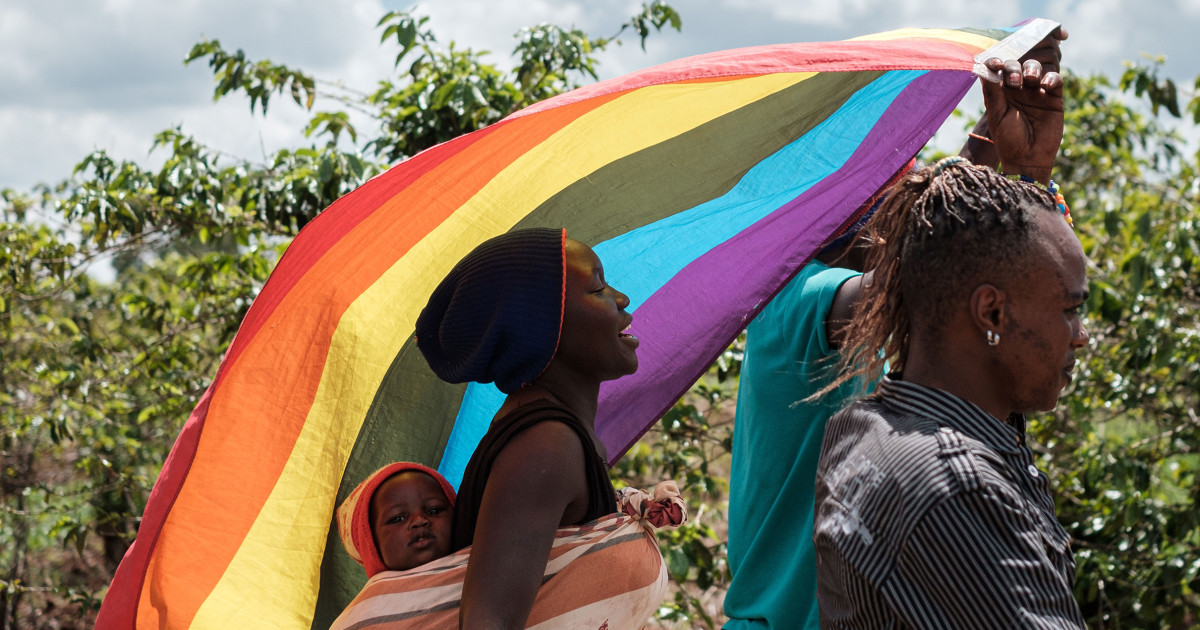
LIMURU, Kenya — Already an outsider, Ugandan refugee Constance fears a plan to integrate hundreds of thousands of asylum seekers into Kenyan society will instead further alienate him and other LGBTQ refugees at a time of rising hostility.
The Shirika Plan, launched by President William Ruto last month, will transform two of the world’s largest refugee camps into open cities and allow the country’s more than 800,000 refugees to finally get jobs, health care and other services.
Under Shirika, which means “coming together” in Swahili, the nearly half-million refugees at the Kakuma camp in the north and the Dadaab camp near the Somali border can choose to leave the settlements to live alongside other Kenyans.
“The idea of integration is good, because it will guarantee refugees a free life and all rights, like any other Kenyan,” said Constance, who runs a safe house for Ugandan LGBTQ refugees. He did not give his last name for safety reasons.
But Constance said groups representing LGBTQ people have not been invited to public forums held in major cities to debate the plan, which was first floated in 2023.
“Unlike other refugees, we have serious concerns about security, health and housing that should be incorporated … But how will we voice these issues when we are not part of the process?” he said.
Kenya’s refugee commissioner John Burugu said all those affected by the Shirika Plan had been invited to comment.
“We have not locked any one or group out of the process,” Burugu told the Thomson Reuters Foundation by phone.
“You don’t have to physically attend the public participation forums. We have people, groups and organizations who submitted written memoranda, and we captured their views.”
But organizations defending the rights of LGBTQ refugees fear this vulnerable group is being ignored.
Chance for inclusion
The multi-year Shirika Plan has been lauded by the U.N. refugee agency UNHCR as an opportunity to improve the lives of refugees and create economic opportunities for Kenya.
For decades, Kenya has hosted refugees, mostly from Somalia, South Sudan and the Democratic Republic of Congo, many of whom have built lives in the sprawling expanses of Kakuma and Dadaab and whose children are now adults, having known no other home.
Yet people in these camps live in limbo, unable to legally open bank accounts, start businesses or work. State schools do not accept refugee pupils, and asylum seekers need permits to move around the country.
Kenya’s 2021 Refugees Act was supposed to address these gaps, but bureaucratic hurdles and a lack of resources have prevented its full implementation.
At the Shirika Plan’s formal launch in Nairobi, U.N. High Commissioner for Refugees Filippo Grandi said it “recognizes that solutions, which shift away from refugee dependency on humanitarian aid towards greater self-reliance, are possible.”
Ruto described Shirika as “our bold, homegrown solution” that would be centered on human rights.
The plan will be implemented through 2036 and is expected to cost about $943 million.
Funding will come from the World Bank, UNHCR and private institutions, and the Kenyan government is due to allocate resources in its budget in June.
However, the plan has faced opposition from some community leaders.
Daniel Epuyo, a member of parliament for the Turkana West constituency where Kakuma is situated, said community leaders were not adequately consulted. The leaders are calling for repatriation instead of integration.
Anti-LGBTQ sentiment
Activists fear the Shirika Plan could worsen anti-LGBTQ sentiment in Kenya and other parts of Africa that has increased in recent years.
Kenya was once considered a haven for LGBTQ refugees, and the U.N. said 1,000 Ugandans sheltered here in 2021 — a figure that has likely grown since neighboring Uganda passed a law in 2023 that includes the death penalty for “aggravated homosexuality.”
Kenya has statutes criminalizing same-sex relations, though they are rarely enforced. Yet cases of homophobic abuse and discrimination occur, and activists fear LGBTQ people, including refugees, are being politically targeted.
Last year, Burugu said being persecuted as an LGBTQ person is not grounds for protection in Kenya.
Homophobic attacks in the camps, particularly Kakuma, mean the government must take precautions under the Shirika Plan, said Craig Paris, executive director of the Refugee Coalition of East Africa.
“If it is happening in controlled and secured camps, it might as well get worse in open communities unless the government takes deliberate steps to address it,” Paris said.
Kamya Chrisestom, a refugee in Kakuma who was attacked, said refugees were worried about their safety.
“Will my security as a transgender be assured when we mix with the host community?” she asked.
LGBTQ groups had petitioned donor agencies to pressure the Kenyan government to incorporate gay rights into the Shirika Plan, said Ibrahim Kazibwe, founder of the Community Empowerment and Self-Support Organization.
“President Ruto said that the implementation of the plan will be centered on human rights, and we hope that those rights will as well include LGBTQ rights,” Kazibwe said.
The UNHCR has worked closely with the government to ensure that “no group is left behind,” said Njoki Mwangi, a spokesperson for the agency in Nairobi.
“Key among the guiding principles was inclusivity and non-discrimination on the bases of race, ethnicity, religion, nationality, gender or any other grounds,” Mwangi told the Thomson Reuters Foundation.
But many gay refugees point to years-long delays in the government’s processing of their asylum bids as a major obstacle to securing their rights.
Constance, 32, lives in the town of Limuru northwest of Nairobi with 15 other Ugandans, who are all waiting for a decision on their asylum applications.
He does not know why his bid has not been approved since he first applied eight years ago, and the delay has worn him down.
“I underwent the last vetting process in 2023, but I am yet to receive feedback,” he said. “I lost hope along the way.”
#LGBTQ #refugees #Kenyas #reform #plan #risks #leaving










